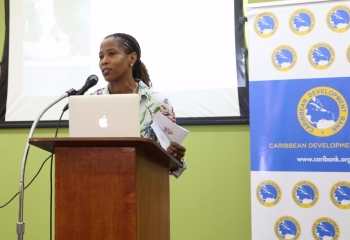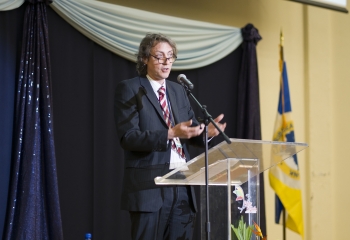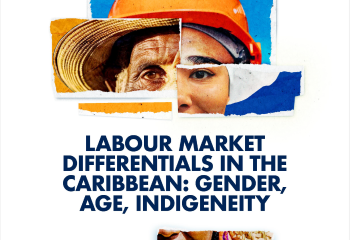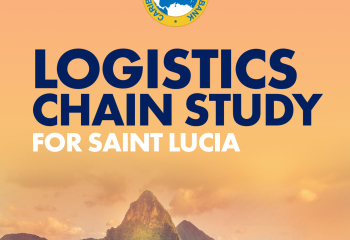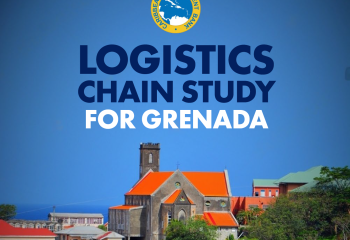Achieving Security and Development in the Caribbean through Regional Cooperation
Good morning. On behalf of the staff, management, and Board of the Caribbean Development Bank (CDB), I am pleased to join you today.
Almost 20 years ago in a Report to the United Nations, then Secretary General observed that “In the 21st century all states and their collective institutions must advance the cause of larger freedom – by ensuring freedom from want, freedom from fear, and freedom to live in dignity.” In an increasingly interconnected world, progress in the areas of development, security, and human rights must go hand in hand. To be clear, there will be no Development without security and no Security without development. Both security and development depend on respect for human rights and the rule of law.
This morning I will explain why this often ignored but inextricable link [between security and development] has been the lived reality for the countries of this Region for decades.
As countries in the Caribbean Region, collectively we have faced and will continue to face a rapidly growing set of challenges, ranging from (i) climate change and associated hydro-meteorological impacts; (ii) the threat of geological hazards including: volcanoes, landslides, earthquakes; and (iii) external shocks such as the global economic and financial crisis and the COVID-19 pandemic. An under-focussed issue is security, although it is arguable that it is thread that runs through all of the above. Indeed, regional security issues have the potential to fuse together with increasing environmental and economic threats thereby threatening broad-based instability to socioeconomic conditions within our Region.
These age-old externalities and the associated connection to security and development all point to the fact that sustainable development must be holistic — to put it differently, it cannot be a slice taken from the development agenda for actioning through siloed interventions. Development at best, must be a strategic interweaving exercise bringing together multi-disciplinary expertise, past experiences, and cultural knowledge to inform solutions to our biggest challenges. Why? - because all issues that we face in the development space are linked and evolving; we cannot separate or segment the parts if we are to achieve real change in the Region.
In fact, the nature of our development challenge is two-fold: first we need connectivity, like a glue, to hold the parts together as a whole (think of this as being a holistic system, like a sphere). This has three parts to it: physical (integrated logistics), digital (integrated information), and cultural (integrated people). Second, we need to ensure that as the system (sphere) evolves it remains a sphere (that is, maintains systemic integrity) — any deformity (for example from addressing issues in one part of the sphere) will prevent the sphere from advancing/moving the way it was designed to do! Any instability from anywhere in the system that cannot be reversed (that is lacks resilience) will compromise the integrity of the system. Excellencies, simply put systemic integrity is imperative for holistic development! And that translates to stability, which is turn translates to security. So, security, broadly defined is at the heart of development.
How Do We Pursue Development?
Excellencies, ladies, and gentlemen let’s be clear — we can and must do better! While our various regional and international treaties and commitments to the United Nation’s 2030 Sustainable Development Agenda have helped focus our minds on the necessity of preserving and improving the welfare and the quality of life for communities, we have not attained a superlative delivery score. Let me be blunt — the pursuit of development starts and is maintained with a commitment to implementation, and with that - delivery on outcomes.
At CDB, we embrace that philosophy and believe that to achieve sustainable development we must build a resilient ecosystem, one that encompasses all dimensions including social, financial, environmental, institutional, and productive capacity resilience. This has translated into areas of strategic priorities, including energy security, climate security, food and nutritional security, education and skills development, social protection, digital transformation, and innovation for economic diversification.
Therefore, CDB’s approach to holistic development is driven by multi-sectoral, multi-disciplined, and multi-faceted policy solutions. We contend that no single entity, individual, or group can accomplish sustainable development on its own. It can only be achieved through partnerships — partnerships in knowledge creation and dissemination, partnerships in financing, partnerships between the public and private sectors, partnerships within the Region and between the Region and the rest of the world. In other words, we need to share to grow!!
Nexus Between Security (In All Forms) and Development
Against that backdrop on development, let’s zero in on security. Similar to other regions around the world, security for the Caribbean entails mitigating against risks (within and cross-border) in almost all spheres of human and business activity. Security is therefore multi-pronged and encompasses, among other things: citizen security, economic security, food security, as well as environmental and climate security. An instability in any of these, if not managed appropriately, will lower resilience buffers, weaken systemic integrity, and stymie our development efforts.
Excellencies, ladies and gentlemen, the nexus between security and sustainable development is not a new one, as this has been long recognised since the mercantilist era. Neither is it unique to the Caribbean region, but our mostly porous borders along with the overlapping of exclusive economic zones, mean that we face significant challenges to the management of safe and legitimate movement of goods and people. This point highlights the fact that a more robust collective, regional approach by all policy practitioners is necessary to achieve full potential. I propose that we move away from the current structure of bilateral support and discussions to a transformative agenda, which puts regionally owned cooperative solutions and integration at the heart of security preparedness. There is no denying that such a transformative agenda will lead to improved conditions for sustaining economic growth and development. This transformative agenda is urgent — let’s start it today, not tomorrow, not next year. The current socio-economic reality in our Region is one marked with several setbacks, admittedly consistent with global trends. United Nations estimates that key development anchors in health, education, and standard of living receded to 2016 levels following the overlapping crises of the COVID-19 pandemic, geopolitical tensions, natural disasters, and financial market shocks. Significantly, more than 90% of countries witnessed at least one-year loss in human development between 2020 and 2021, compared to 2008/2009 where one in ten countries lost ground after the Global Financial Crisis[1]. As a result, our Region must transform rapidly, without pause, and innovatively to address inherent structural weaknesses to support a stronger and more resilient regional ecosystem; one that is well protected and secured, even in times of economic, social, and environmental uncertainty and distress.
Crime Prevention and Security
Let me examine some specific aspects of security. First, crime prevention programmes. For us at CDB, these are critical components for resilience building in the development space. These programmes can be highly effective when they address social conditions, such as inequalities, that contribute to crime and when they create opportunities to reduce marginalisation of vulnerable groups[2].
The Climate Crisis and Security
Another significant element in our security and stability is the climate crisis. The Caribbean remains on the frontline of climate change, facing some of the worst impacts, including more frequent and powerful storms, sea level rise, floods, and coastal degradation. The Inter-governmental Panel on Climate Change Sixth Assessment Report indicates starkly that at warming above 1.5°C, collapses in fisheries and biodiversity will imply significant economic decline and livelihood failures. This is particularly concerning for the socio-economic stability of the Region given the contributions of agriculture and tourism to gross domestic product and the fact our countries are already facing the challenge of food insecurity. And as seen in 2017 and 2019, any gains can be easily reversed by single climate-related event.
In taking a holistic approach to the intersection between security and development in the Region, we must consider how citizen security is impacted by climate preparedness and resilience. According to the International Monetary Fund, limited climate adaptation raises the likelihood of impacts that can exacerbate inequalities and push people further into poverty[3]. Such socio-economic instability also raises the risk of crime, given the correlation that has been established between inequality and crime (UNDP, 2021)[4]. Given these threats, there is greater need for the region to focus on climate action that directly or indirectly through linkages protects against the loss of economic and social stability.
For its part, the CDB will continue to support the effort towards building greater climate resilience for the achievement of sustainable development. Already, the Bank is using its balance sheet and mobilising concessionary resources to finance climate related projects and to strengthen the enabling environment to support resilient climate actions. In 2022, the Bank committed an estimated USD41.0 million (mn) of its own funds toward climate change initiatives, mainly in energy and infrastructure. These initiatives are designed to produce positive economic and social impacts.
Security as a re-enforcing framework for Mutual Cooperation
[Regional Security System (RSS) as an active example of development through collective action]
Turning to an example of development through collective action, I can think of no better example than the Regional Security System (RSS). It is clear that the RSS, by virtue of its mandate and delivery to date, embraces the multifaceted nature of security and its nexus with development. I think I can speak on behalf of all in this room to say we appreciate greatly the contribution of the RSS to the regional development agenda.
Over the years, the RSS has been on the front line for hydro-meteorological and geological impacts and recovery, as well as the response to the pandemic. It embodies the spirit of collaboration towards the achievement of development initiatives and represents a real-life example of how small states can cooperate, collaborate, and pool resources to sustain recovery and stability efforts.
If we take a lesson from any of our past experiences, we come to the pellucid realisation that when it comes to development, we cannot prevent shocks neither can we face them alone, but we can prepare to withstand their impact by expanding our resilience ecosystems through strengthening our institutions, our societies, and our economies.
Security as a Regional Public Good
Indeed, as we seek to rethink development in the Region, founded on pillars of resilience, it will also be necessary to re-examine security as a regional public good, especially as a fourth pillar of integration.
With shared values, experiences and vulnerabilities, countries of the Caribbean region are natural partners for resolving the potentially destabilising circumstances we can face. In my view, the time has come for us to recognise the benefits that can accrue from shared ownership and costs towards the long-term success in addressing security and in creating an enabling bedrock for economic resilience and sustainability.
In fact, I believe that there has never been a more opportune time for us to strengthen our collaboration and reinforce our mutual purpose through a holistic approach. In assessing this forward-looking path, we can all recognise that the regional security framework is a strategic component in our integrated development agenda that cannot be separated from the pillars of economic, environmental, and social resilience.
Taking this approach means that we need to reflect on how to strategically solidify security as a regional public good, and on how we must re-think our approach to cooperation and collaboration with strategic development partners. Let me highlight two issues that can stymie our progress:
- The first relates to the approach to donor financing provisions, which are limited to direct bilateral channels as opposed to a cooperative framework aimed at addressing gaps throughout the regional security landscape. Continuing with the current approach implies a continued pursuit of segmented solutions to what are regional challenges, and hence less likely able to achieve comprehensive and sustainable results.
- The second relates to the ownership of the security space by key actors in this area. Currently, specific country innovations appear to be driven by access to donor financing. In the spirit of regional collaboration and development outcomes, should we not re-examine how to build complementarity and regional public value through stronger coordination between development partner agendas and the execution of the regional framework?
Excellencies, ladies, and gentlemen, let me again reiterate that we need to make a strong call for the fundamental shift to cooperation, collaboration, and financing that ensures there is regional ownership and direction of the security framework. To achieve this, we need to find appropriate financing mechanisms such as the establishment of regional trust fund that will ensure a programmatic and importantly a sustainable approach to maintaining regional security. I crave your indulgence in considering this worthwhile initiative at this RSS conference – an initiative that CDB is prepared to champion.
CDB as a Strategic Partner on Regional Cooperation and Security
Turning to the role of CDB, let me state that CDB considers itself as a strategic partner of the Region’s security agenda. In the past, we have worked with the RSS to support the achievement of its strategic objectives, to enhance the maritime security capacity of Member States, and to counter threats of transnational organised crime and cybercrime that have the potential to curtain or trade performance by destabilising territorial integrity, maritime sovereignty, and border security.
CDB provided financing to a landmark project in collaboration with the RSS, to develop an inclusive Regional Maritime Security Strategy and an overarching territorial integrity security policy that would also assist RSS Member States in developing integrated and cohesive frameworks for national security strategies in accordance with CARICOM Crime and Security Strategy 2013.
The Bank’s commitment and collaboration to prioritise regional security as a public good was also demonstrated through the CARIFORUM-European Union (EU) Environmental Protection Agency and the CARICOM Single Market and Economy (CSME) Standby Facility for Capacity Building Project [titled] “Establishment of Integrated Border Systems for The Organisation of The Eastern Caribbean States”. The project is being implemented through a strategic partnership with the CARICOM Implementation Agency for Crime and Security and the EU. It leverages technological advancements and cooperation to improve the collection and use of data for enhancing border system operations and safety through a Maritime Single Window. Countries will also benefit from the establishment of a risk management framework that assists their customs administrations in strengthening safety and security across the Region. The end goal of this 30-month holistic initiative is increased private sector competitiveness, to be achieved through more secure and efficient port systems that can attract greater trade opportunities with global markets. I am sure you will agree that the establishment of a single secure digital grid, connected digital government systems, and increased use of technological advances in data analytics and intelligence systems can take the regional public value of this initiative to even higher levels. This would be sequential development.
Through these interventions the Bank has shown that it is willing to be a key player with the Region’s security agencies to promote security as a regional public good and to approach its support from a programmatic sense.
Excellencies, ladies, and gentlemen before I close, let me take this opportunity to emphasise the following points:
In closing, allow me to express my sincere thanks to the RSS and Commodore Shurland for their ongoing commitment and partnership through specialised technical expertise that strategically positions regional security at the foundation of sustainable development for our Member Countries. CDB looks forward to building on these synergies through continued joint efforts to achieve a more prosperous and resilient Region, one that improves lives and livelihoods of people through security mechanisms that successfully provide innovative and integrated solutions to current socio-economic vulnerabilities.
Thank you.
[1] Geneva Solutions. 2022. Overlapping crises set back global development in 9 out of 10 countries, UN says. Link: https://genevasolutions.news/peace-humanitarian/overlapping-crises-set-back-global-development-in-9-out-of-10-countries-un-says
[2] United Nations Development Report. 2012. Link: https://www.undp.org/publications/caribbean-human-development-report-2012
3 International Monetary Fund. 2021. Linking Climate and Inequality. Link: https://www.imf.org/en/Publications/fandd/issues/2021/09/climate-change-and-inequality-guivarch-mejean-taconet
4 United Nations Development Programme. 2021. Inequality and Crime in Latin America and the Caribbean. Link: https://www.undp.org/latin-america/publications/inequality-and-crime-latin-america-and-caribbean-new-data-old-question
- As regional institutions working alongside strategic development partners, we need to challenge ourselves to innovate, lead, and support the region as we seek to overcome development challenges.
- With security as a regional public good and as the fourth pillar of integration within the Caribbean, specifically the CSME, the Caribbean requires a bold and ambitious shift from bilateral support to the involvement of regional institutions – such as CDB and the RSS – in the roles for which they were originally designed, that is to foster sustainable development.
